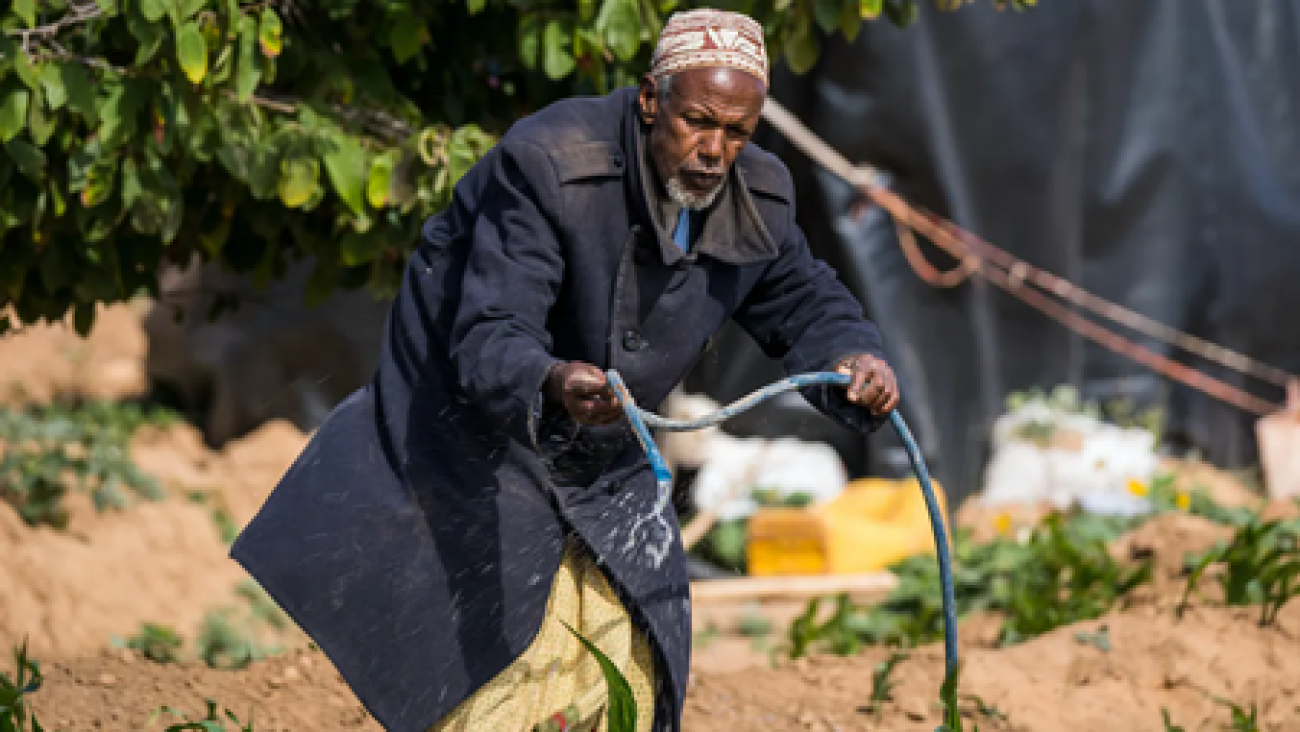Yasin Muhumad Faarah is a 70-year-old farmer, village elder and community leader. He lives in a rural area near Jigjiga in the Somali region of Ethiopia. He and his community are beneficiaries of the ILO project: Enhancing Disaster Resilience through Employment-Intensive Waterworks in Jigjiga and Kebribeyah. Here’s his story:
In a recent drought all my cattle died. I depend on farming to provide for my family. Some members of our rural community had no water at all.
On my farm we grow different trees. There are mango trees and guava. We planted sorghum. I also have sheep and cows, but we mostly depend on agriculture. We are all farmers in my community, my Kebele, which is called Caradamadow.
I have always worked on my farm and I would like to work in agriculture for the rest of my life and continue making a living from it to support my five sons and three daughters. We don’t have a health centre or hospital near us, and we have no roads, so if a woman goes into labour or someone gets sick it can be difficult to find a way to get out, to get to the hospital, especially if there is rain. Our Kebele doesn’t have electricity either, even though there are electric wires nearby. So, along with access to water, these are the biggest problems we face in our community. Last year, a group of people from a non-governmental organization and the International Labour Organization (ILO) came to visit us. We welcomed them and we all gathered for a meeting. They told us that they were proposing to build a basin to collect rainwater and that they were looking for a place to build it. When I heard this, I offered my farmland to them.
At first, people were shocked when I gave them my land for this project. They thought that I’d given it away for nothing, or that I was giving my land to the government. Now when they see the water collection basin all of them wish it was closer to their farm.
The people running the project also gave us good job opportunities. In total 41 members of the community benefited from the project to build the basin. No one got refused. Everyone got paid.
We worked for four months. I worked as a watchman. I spent all the summer season working with them. As a result, I survived the drought season, despite losing my cows, by using the income from this job.
Before we started work on the basin, the ILO told me that men and women would work together – 25 men and 15 women. I was surprised. It was something new for us.
I admit that before the project I thought that women couldn’t work. When you live in a rural area no one thinks women can do anything.
But once we got started and saw the women working like men, working really hard, we learned that women can work as well as men, if not better. The women helped a lot and we completed our job successfully.
With the money we earned from the building of the basin, we paid for our children’s school uniforms and provided them with pens, pencils and books. Every Thursday we paid for a religious teacher to teach them about the Koran. Education has a lot of benefits. If we are educated, we can better understand things, and read and write. Then you can work in offices, and you can operate different machines. Also, education is important for this world and the hereafter. You can connect with Allah when you can read the religious texts. Reading and learning the Koran will help you to do good deeds.
In our region, other communities want to have a basin near their place. Now that we have been trained we can collaborate with the ILO when they plan to build a basin elsewhere. We are ready to convince other people as we have benefited from the project. We will tell them how to build a basin and what the advantages are. If Allah fills the basin with rainwater we can use it for all the dry season, and our entire Kebele community will get water from there.
Now that I can easily access the water for the farm, I want to expand and grow more crops. This will allow me to send my children to the city to get a better education. If we eventually have a good road, as well as enough water, we will be fine. We will be able to sell our agricultural products to people living in the city. There is nothing that we fear now, we are safe. We used to beg for water from the city, but now that we have the basin we won’t need to beg for water anymore.



